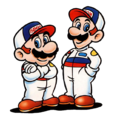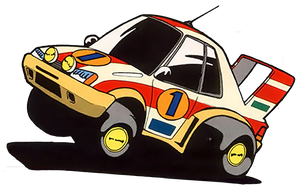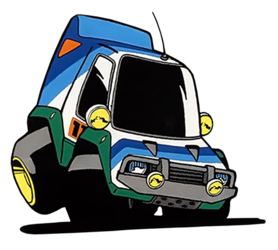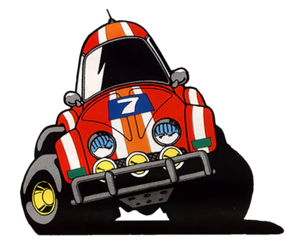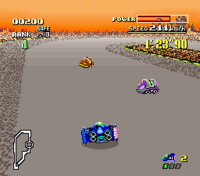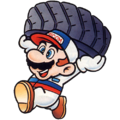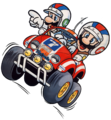Famicom Grand Prix II: 3D Hot Rally: Difference between revisions
m (spacing) |
(→Media: Having played this substantially, I'm pretty sure that's pretty much all of them.) |
||
| (212 intermediate revisions by 63 users not shown) | |||
| Line 1: | Line 1: | ||
{{ | {{italic title}} | ||
| | {{redirect|3D Hot Rally|the soundtrack album|[[3D Hot Rally (album)]]}} | ||
|image=[[ | {{game infobox | ||
|developer= | |image=[[File:HotRally.png|260px]] | ||
|publisher= | |developer=[[Nintendo EAD]] <br> [[HAL Laboratory]] | ||
| | |publisher=[[Nintendo]] | ||
| | |release={{flag list|Japan|April 14, 1988<ref>{{cite|date=February 13, 2024|url=https://www.nintendo.com/jp/famicom/software/fmc-fg2/index.html|title=FAMICOM GRAND PRIX Ⅱ 3D HOT RALLY | ファミコン40周年キャンペーンサイト | 任天堂|publisher=Nintendo|language=jp|accessdate=December 1, 2024|archive=web.archive.org/web/20240213165102/https://www.nintendo.com/jp/famicom/software/fmc-fg2/index.html}}</ref>}} | ||
|languages={{languages|en_us=y}} | |||
|genre=Racing | |genre=Racing | ||
|modes=Single player | |modes=Single player | ||
|ratings= | |ratings= | ||
|platforms=[[ | |platforms=[[Family Computer Disk System]] | ||
| | |format={{format|fds=1}} | ||
| | |input={{input|fc=1}} | ||
| | |serials={{flag list|Japan|FSC-TDRE}} | ||
|}} | |}} | ||
[[Mario]] and [[ | '''''Famicom Grand Prix II: 3D Hot Rally''''' is a racing video game released in [[Japan]] for the [[Family Computer Disk System]]. It is the sequel to ''[[Famicom Grand Prix: F1 Race]]'', although the two games are very different. Like its predecessor, it too was subject of a tournament, which was held from April 14 to May 31, 1988. The top 100 players of each class of car received a trophy in the form of a gold car of their class encased in quartz crystal with their name and rank on the base. Thus, there are 300 such trophies. They, along with thousands of runners-up and raffle winners, received a "Pretty Mini," which is a yellow stationery set in the form of Diskun, the FDS mascot. It is similar to a white stationery set that was sold in stores.<ref>{{cite|language=ja|deadlink=y|archive=web.archive.org/web/20230421013843/https://pony.velvet.jp/fcdisk/fdsidxmnlsealallst6.html|title=ディスクシステム - パッケージアート6|publisher=箱のすみっこげーむ資料|accessdate=July 26, 2024}}</ref><ref>{{cite|publisher=Famicom World|language=en|url=famicomworld.com/workshop/articles/the-holy-grails/holy-grails-stationary-set|title=Holy Grails – Stationary Set|accessdate=July 26, 2024}}</ref> They also received mock driver's licenses.<ref>{{cite|url=www.youtube.com/watch?v=ky8UJqmhR_I|title=【激レア賞品】 入賞トロフィー&プリティミニ(文具セット)! ファミコンの3Dホットラリーの入賞賞品を紹介しちゃうよ!|publisher=YouTube|language=ja|date=August 2, 2020|accessdate=July 26, 2024|author=駄菓子屋ゲーム博物館チャンネル}}</ref> The game supports the [[Family Computer#Famicom 3D System|Famicom 3D System]], allowing the player to see the screen in three-dimensions by wearing a specialized set of goggles. The game's name makes note of said capabilities. | ||
< | |||
''Famicom Grand Prix II: 3D Hot Rally'' marks the first time that [[Luigi]] appears taller and thinner than [[Mario]] on a game's box art, though this distinction was established in official artwork in the film ''[[Super Mario Bros.: Peach-hime Kyūshutsu Dai Sakusen!]]'' | |||
This game, along with its predecessor, is a possible ancestor to the ''[[Mario Kart (series)|Mario Kart]]'' series, most likely due to the fact that it features Mario and possesses similar 2D racing mechanics, which was later carried on to ''[[Super Mario Kart]]''. | |||
==Gameplay== | |||
''Famicom Grand Prix II: 3D Hot Rally'' is a racing game with similar gameplay to that of ''{{wp|Rad Racer}}''. There are three different courses in the game, and they all have several multiple paths that split up that players can choose between. Before the race begins, the player can choose a repair point. This acts as a check point that repairs damage sustained by the vehicle, such as when it crashes into obstacles. A damage indicator on the bottom right of the game will display the vehicle's condition; once the damage indicator is fully depleted, the game will end. The player can opt to pause the game and select "Repair" from the menu to avoid this, but depending on how much damage the vehicle has sustained, the longer this repair will take. Prior to each race, the player can set one check point as a designated repair point with flashing signs, instantly recovering some damage when it is passed through. | |||
The game is not a traditional racing game in the sense the goal is not to finish first, but rather to finish before the timer ends. The player starts with 20 seconds in the "Time Bank." Each alternate path, or "leg," of the course has a predetermined expected time frame of completion. If players do not meet that time frame, the seconds from the Time Bank will subtract. However, if players finish the leg in under the expected time indicated, the seconds remaining from it will be added on to the Time Bank. If the Time Bank is fully depleted, the vehicle will automatically switch to neutral transmission and begin gradually slowing down as long as it is not angled downhill; if the vehicle stops with an empty time gauge, the game will end. | |||
Scattered throughout the course, usually in groups of five, are [[Hot Dot]]s: collecting eight of them will grant the vehicle an additional gear for a temporary 15 seconds that allows it to speed up to 300 km/h. | |||
==Characters== | |||
===Main characters=== | |||
<gallery> | |||
Mario and Luigi 3DHR.png|[[Mario]] (driver) and [[Luigi]] (navigator) | |||
</gallery> | |||
===Vehicles=== | |||
{|border=1 style="text-align:center" | |||
|- | |||
!colspan=3 style="background:red;color:white"|Vehicles | |||
|- | |||
|width=33%| | |||
{|border=1 cellspacing=0 cellpadding=4 margin=0 padding=0 style="border:1px solid black; border-collapse:collapse; height:100%" width=100% | |||
|- | |||
!style="background:#EAECF0; height:32px" align="center" colspan=2|[[File:FGPII Kattobi select.png]]<br><big>'''{{text outline|{{color link|white|Kattobi}}}}'''</big><br>Sports car | |||
|- | |||
!style="background:white; height:250px" align="center" colspan=2|[[File:FamicomIICar1.png|300x250px]] | |||
|- | |||
!width=50% style="background:#EAECF0"|Top Speed: | |||
|width=50%|'''220km/h''' | |||
|- | |||
!style="background:#EAECF0"|1/4 Mile: | |||
|'''13.71 sec.''' | |||
|- | |||
!style="background:#EAECF0"|Highway: | |||
|★★★ | |||
|- | |||
!style="background:#EAECF0"|Grass: | |||
|★★★ | |||
|- | |||
!style="background:#EAECF0"|Snow: | |||
|★☆☆ | |||
|- | |||
!style="background:#EAECF0"|Sand: | |||
|★☆☆ | |||
|- | |||
!style="background:#EAECF0"|Dirt: | |||
|★☆☆ | |||
|} | |||
|width=33%| | |||
{|border=1 cellspacing=0 cellpadding=4 margin=0 padding=0 style="border:1px solid black; border-collapse:collapse; height:100%" width=100% | |||
|- | |||
!style="background:#EAECF0; height:32px" align="center" colspan=2|[[File:FGPII Yonque select.png]]<br><big>'''{{text outline|{{color link|blue|Yonque}}}}'''</big><br>4WD | |||
|- | |||
!style="background:white; height:250px" align="center" colspan=2|[[File:FamicomIICar3.png|300x250px]] | |||
|- | |||
!width=50% style="background:#EAECF0"|Top Speed: | |||
|width=50%|'''200km/h''' | |||
|- | |||
!style="background:#EAECF0"|1/4 Mile: | |||
|'''17.03 sec.''' | |||
|- | |||
!style="background:#EAECF0"|Highway: | |||
|★★☆ | |||
|- | |||
!style="background:#EAECF0"|Grass: | |||
|★★☆ | |||
|- | |||
!style="background:#EAECF0"|Snow: | |||
|★★★ | |||
|- | |||
!style="background:#EAECF0"|Sand: | |||
|★★☆ | |||
|- | |||
!style="background:#EAECF0"|Dirt: | |||
|★★☆ | |||
|} | |||
|width=33%| | |||
{|border=1 cellspacing=0 cellpadding=4 margin=0 padding=0 style="border:1px solid black; border-collapse:collapse; height:100%" width=100% | |||
|- | |||
!style="background:#EAECF0; height:32px" align="center" colspan=2|[[File:FGPII Monster select.png]]<br><big>'''{{text outline|{{color link|red|Monster (vehicle)|Monster}}}}'''</big><br>Buggy | |||
|- | |||
!style="background:white; height:250px" align="center" colspan=2|[[File:FamicomIICar2.png|300x250px]] | |||
|- | |||
!width=50% style="background:#EAECF0"|Top Speed: | |||
|width=50%|'''180km/h''' | |||
|- | |||
!style="background:#EAECF0"|1/4 Mile: | |||
|'''15.59 sec.''' | |||
|- | |||
!style="background:#EAECF0"|Highway: | |||
|★☆☆ | |||
|- | |||
!style="background:#EAECF0"|Grass: | |||
|★☆☆ | |||
|- | |||
!style="background:#EAECF0"|Snow: | |||
|★★☆ | |||
|- | |||
!style="background:#EAECF0"|Sand: | |||
|★★★ | |||
|- | |||
!style="background:#EAECF0"|Dirt: | |||
|★★★ | |||
|} | |||
|} | |||
===Obstacles=== | |||
{|border=1 cellpadding=3 style=border-collapse:collapse;width:100% | |||
|-style="background:gray;color:white" | |||
!width=10%|Name | |||
!width=70%|Description | |||
|-style=background:#219F4B;color:white | |||
|- | |||
!style="background:#EAECF0" align="center"|Opponent | |||
---- | |||
[[File:FGPII Rival A light.png]] [[File:FGPII Rival B light.png]] [[File:FGPII Rival C light.png]]<br> | |||
[[File:FGPII Rival A mid.png]] [[File:FGPII Rival B mid.png]] [[File:FGPII Rival C mid.png]]<br> | |||
[[File:FGPII Rival A dark.png]] [[File:FGPII Rival B dark.png]] [[File:FGPII Rival C dark.png]] | |||
|Other racers which drive along the track, potentially getting in the way. They are the only obstacles that actively move around. | |||
|- | |||
!style="background:#EAECF0" align="center"|[[Abunaiwa]] | |||
---- | |||
[[File:Abunaiwa.png]] [[File:FGPII Abunaiwa gray.png]]<br> | |||
[[File:FGPII Abunaiwa snow.png]] [[File:FGPII Abunaiwa turquoise.png]] | |||
|Angry rock piles that most often appear in desert areas. They are usually on the sides of the road, but occasionally appear in the middle. | |||
|- | |||
!style="background:#EAECF0" align="center"|[[Nanisuruki]] | |||
---- | |||
[[File:Nanisuruki.png]] [[File:FGPII Nanisuruki pine.png]] [[File:FGPII Nanisuruki pink.png]]<br> | |||
[[File:FGPII Nanisuruki snow.png]] [[File:FGPII Nanisuruki red.png]] | |||
|Leering shrubs that most commonly appear in grasslands. They are generally alongside the road, though in rougher terrain they may appear on it. | |||
|- | |||
!style="background:#EAECF0" align="center"|[[Jamadatō]] | |||
---- | |||
[[File:Jamadato.png]] [[File:FGPII Jamadato orange R.png]] [[File:FGPII Jamadato green.png]] [[File:FGPII Jamadato green R.png]]<br>[[File:FGPII Jamadato blue.png]] [[File:FGPII Jamadato blue R.png]] | |||
|Tall streetlamps that appear regularly spaced alongside roads, most commonly in city areas. Due to their height, they cannot be jumped over without the Hot gear being active. | |||
|- | |||
!style="background:#EAECF0" align="center"|Pillar | |||
---- | |||
[[File:FGPII Pillar light.png]] [[File:FGPII Pillar dark.png]] | |||
|Medium-sized stone plinths that appear rarely in unpaved areas. They can appear anywhere beside or on the road an can only be leaped by the tallest standard jumps. | |||
|- | |||
!style="background:#EAECF0" align="center"|Sign | |||
---- | |||
[[File:FGPII Sign light.png]] [[File:FGPII Sign mid.png]] [[File:FGPII Sign dark.png]] | |||
|Inverted checkpoint signs appear in a few areas, usually cities. They are medium height. | |||
|} | |||
===Helpful objects=== | |||
{|border=1 cellpadding=3 style=border-collapse:collapse;width:100% | |||
|-style="background:gray;color:white" | |||
!width=10%|Name | |||
!width=70%|Description | |||
|-style=background:#219F4B;color:white | |||
|- | |||
!style="background:#EAECF0" align="center"|[[Hot Dot]] | |||
---- | |||
[[File:FGPII Hot Dot.gif]] | |||
|Exclamation marks that occasionally appear in clusters along the track. Collecting eight allows a temporary, but substantial speed boost. | |||
|- | |||
!style="background:#EAECF0" align="center"|[[Check Point]] | |||
---- | |||
[[File:FGPII Check Point left.png]] [[File:FGPII Check Point right.png]] [[File:FGPII Check Point left mid.png]] [[File:FGPII Check Point right mid.png]]<br>[[File:FGPII Check Point left dark.png]] [[File:FGPII Check Point right dark.png]] | |||
|These mark the areas between each course's sections. They must be reached within the time limit. | |||
|- | |||
!style="background:#EAECF0" align="center"|[[Repair Point]] | |||
---- | |||
[[File:FGPII Check Point left special.gif]] [[File:FGPII Check Point right special.gif]] | |||
|These Check Points are set before the race begins, with one taking the place of a single normal Check Point. Passing through them instantly restores damage. | |||
|- | |||
!style="background:#EAECF0" align="center"|Goal | |||
---- | |||
[[File:FGPII Check Point left special.gif]] [[File:FGPII Check Point right special.gif]] | |||
|This special Check Point appears at the very end of each stage. Reaching it is required to set a record. | |||
|} | |||
===Courses=== | |||
Each course goes through various environments across its length. The road on each course splits and merges back at various point, but no matter which route is taken, the player will go through eight check points before the goal. Each segment between check points has different scenery. | |||
{|border=1 cellpadding=3 style=border-collapse:collapse | |||
|- | |||
!style="background:#EAECF0" align="center"|[[Course-1]] | |||
|- | |||
|[[File:3DHR-Course1.png]][[File:FGPII Map Course-1 segments.png]] | |||
|- | |||
!style="background:#EAECF0" align="center"|[[Course-2]] | |||
|- | |||
|[[File:3DHR-Course2.png]][[File:FGPII Map Course-2 segments.png]] | |||
|- | |||
!style="background:#EAECF0" align="center"|[[Course-3]] | |||
|- | |||
|[[File:3DHR-Course3.png]][[File:FGPII Map Course-3 segments.png]] | |||
|} | |||
==Staff== | |||
{{main|List of Famicom Grand Prix II: 3D Hot Rally staff}} | |||
==Development== | |||
[[File:SNES F-Zero.png|thumb|Due to criticism of this game's designs, the later ''F-Zero'' was given a more "serious" aesthetic.]] | |||
''Famicom Grand Prix II: 3D Hot Rally'' was shown to Nintendo of America, who heavily criticized the game, particularly the "cute" design of the vehicles, and stated it would not sell. This reaction made director Kazunobu Shimizu furious and was one of the drivers behind the graphical style of ''[[fzerowiki:F-Zero|F-Zero]]''.<ref>{{cite|deadlink=y|language=en|publisher=Nintendo|date=September 19, 2017|title=F-ZERO Developer Interview|accessdate=July 26, 2024|archive=web.archive.org/web/20170912011823/https://www.nintendo.com/super-nes-classic/interview-f-zero}}</ref> | |||
This game is one of eight that is compatible with the [[Family Computer#Famicom 3D System|Famicom 3D System]]. The flyer for the tournament advertised this system.<ref>{{cite|url=pony.velvet.jp/fcdisk/dskidx/flyer/fsc-tdre_fly1_cd.jpg|title=Tournament flyer|language=ja|format=JPG|publisher=箱のすみっこげーむ資料|accessdate=July 26, 2024}}</ref> | |||
{{br}} | |||
==Gallery== | |||
{{main-gallery}} | |||
<gallery> | |||
Mario with tire 3DHR.png|[[Mario]] holding a tire | |||
3D Hot Rally-tired MarioLuigi.png|A tired Mario and [[Luigi]], resting | |||
FamicomIIArt3.png|Mario popping champagne in front of Luigi | |||
Mario3DRallyCoverArt.png|Mario and Luigi riding in the [[Monster (vehicle)|Monster]] | |||
3DHR Jamadato.png|[[Jamadatō]] | |||
</gallery> | |||
==Media== | |||
{{media table | |||
|file1=Famicom Grand Prix II Title Theme.oga | |||
|title1=Title Theme | |||
|length1=0:30 | |||
|file2=3DHotRally Fireball.oga | |||
|title2=Fireball | |||
|length2=0:30 | |||
|file3=3DHotRally WindCommander.oga | |||
|title3=Wind Commander | |||
|length3=0:30 | |||
|file4=3DHotRally MonsterDance.oga | |||
|title4=Monster Dance | |||
|length4=0:30 | |||
}} | |||
==References in later games== | |||
[[File:MK_NS2_Toad.png|right|thumb|250px|Toad in a kart resembling the Monster in the Switch 2 ''Mario Kart'' game]] | |||
*''[[Super Mario Bros. & Friends: When I Grow Up]]'': The box art's artwork of Mario and Luigi driving the [[Monster (vehicle)|Monster]] is replicated on the "Racecar Driver/Mechanic" page. | |||
*''[[Super Smash Bros. Melee]]'': A trophy of the Monster is obtainable. | |||
*''[[Super Smash Bros. Brawl]]'' / ''[[Super Smash Bros. for Wii U]]'': An arrangement of the title theme, named "Title (3D Hot Rally)", appears in both games. It can be played in the [[Figure-8 Circuit (stage)|Mario Circuit]] stage. | |||
*''[[Mario Kart Wii]]'': The [[Tiny Titan]] is designed after the Monster; its Japanese name translates to "Hot Rally", a further reference to this game. | |||
*''[[Mario Kart 7]]'': The design of the [[Monster (tire)|Monster]] [[tire]]s is heavily based on the tires of the cars in this game. | |||
*''[[Mario Kart 8]]'' / ''[[Mario Kart 8 Deluxe]]'': The [[List of sponsors debuting in Mario Kart Arcade GP and Mario Kart Arcade GP 2#Mario Motors|Mario Motors]] logo features the artwork of Mario holding a tire from this game. The Monster tires also make a return but the rim of the wheel sports a different color, being gray. | |||
*''[[Super Mario Odyssey]]'': The Mechanic Outfit and Mechanic Hat from this game are references to Mario's appearance in ''Famicom Grand Prix II: 3D Hot Rally''. | |||
*''[[Super Smash Bros. Ultimate]]'': The artwork of Mario and Luigi driving the Monster appears as a [[Spirit (Super Smash Bros. Ultimate)|spirit]] in this game. {{file link|SSBU MONSTER Spirit.png|This version}} removes the extra sixth finger from Luigi's right hand. | |||
*''[[Mario Kart (Nintendo Switch 2)|Mario Kart]]'' ([[Nintendo Switch 2]]): A kart based on the Monster appears in this game. | |||
==Names in other languages== | |||
{{Foreign names | |||
|Jpn=ファミコングランプリII スリーディーホットラリー | |||
|JpnR=Famikon Guran Puri Ni: Surī Dyī Hotto Rarī | |||
|JpnM=Famicom Grand Prix II: 3D Hot Rally | |||
}} | |||
==References== | |||
{{NIWA|SmashWiki=List of minor Nintendo universes#Famicom Grand Prix|StrategyWiki=1}} | |||
<references/> | |||
{{FGPII3DHR}} | |||
{{Super Mario games}} | |||
{{NES}} | {{NES}} | ||
[[Category:Famicom Grand Prix II: 3D Hot Rally|*]] | |||
[[Category:Japan | [[Category:Japan-only games]] | ||
[[Category: | [[Category:Family Computer Disk System games]] | ||
[[Category:Games]] | [[Category:Games]] | ||
[[Category:1988 games]] | |||
[[Category:Racing games]] | |||
[[Category:HAL Laboratory games]] | |||
Latest revision as of 09:15, January 23, 2025
- "3D Hot Rally" redirects here. For the soundtrack album, see 3D Hot Rally (album).
| Famicom Grand Prix II: 3D Hot Rally | |
|---|---|
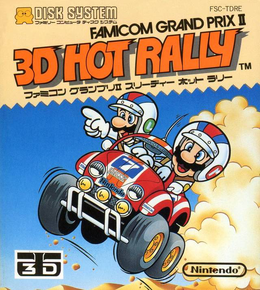 For alternate box art, see the game's gallery. | |
| Developer | Nintendo EAD HAL Laboratory |
| Publisher | Nintendo |
| Platform(s) | Family Computer Disk System |
| Release date | |
| Language(s) | English (United States) |
| Genre | Racing |
| Mode(s) | Single player |
| Format | FDS:
|
| Input | Famicom:
|
| Serial code(s) | |
Famicom Grand Prix II: 3D Hot Rally is a racing video game released in Japan for the Family Computer Disk System. It is the sequel to Famicom Grand Prix: F1 Race, although the two games are very different. Like its predecessor, it too was subject of a tournament, which was held from April 14 to May 31, 1988. The top 100 players of each class of car received a trophy in the form of a gold car of their class encased in quartz crystal with their name and rank on the base. Thus, there are 300 such trophies. They, along with thousands of runners-up and raffle winners, received a "Pretty Mini," which is a yellow stationery set in the form of Diskun, the FDS mascot. It is similar to a white stationery set that was sold in stores.[2][3] They also received mock driver's licenses.[4] The game supports the Famicom 3D System, allowing the player to see the screen in three-dimensions by wearing a specialized set of goggles. The game's name makes note of said capabilities.
Famicom Grand Prix II: 3D Hot Rally marks the first time that Luigi appears taller and thinner than Mario on a game's box art, though this distinction was established in official artwork in the film Super Mario Bros.: Peach-hime Kyūshutsu Dai Sakusen!
This game, along with its predecessor, is a possible ancestor to the Mario Kart series, most likely due to the fact that it features Mario and possesses similar 2D racing mechanics, which was later carried on to Super Mario Kart.
Gameplay[edit]
Famicom Grand Prix II: 3D Hot Rally is a racing game with similar gameplay to that of Rad Racer. There are three different courses in the game, and they all have several multiple paths that split up that players can choose between. Before the race begins, the player can choose a repair point. This acts as a check point that repairs damage sustained by the vehicle, such as when it crashes into obstacles. A damage indicator on the bottom right of the game will display the vehicle's condition; once the damage indicator is fully depleted, the game will end. The player can opt to pause the game and select "Repair" from the menu to avoid this, but depending on how much damage the vehicle has sustained, the longer this repair will take. Prior to each race, the player can set one check point as a designated repair point with flashing signs, instantly recovering some damage when it is passed through.
The game is not a traditional racing game in the sense the goal is not to finish first, but rather to finish before the timer ends. The player starts with 20 seconds in the "Time Bank." Each alternate path, or "leg," of the course has a predetermined expected time frame of completion. If players do not meet that time frame, the seconds from the Time Bank will subtract. However, if players finish the leg in under the expected time indicated, the seconds remaining from it will be added on to the Time Bank. If the Time Bank is fully depleted, the vehicle will automatically switch to neutral transmission and begin gradually slowing down as long as it is not angled downhill; if the vehicle stops with an empty time gauge, the game will end.
Scattered throughout the course, usually in groups of five, are Hot Dots: collecting eight of them will grant the vehicle an additional gear for a temporary 15 seconds that allows it to speed up to 300 km/h.
Characters[edit]
Main characters[edit]
Vehicles[edit]
| Vehicles | ||||||||||||||||||||||||||||||||||||||||||||||||||||||||
|---|---|---|---|---|---|---|---|---|---|---|---|---|---|---|---|---|---|---|---|---|---|---|---|---|---|---|---|---|---|---|---|---|---|---|---|---|---|---|---|---|---|---|---|---|---|---|---|---|---|---|---|---|---|---|---|---|
|
|
| ||||||||||||||||||||||||||||||||||||||||||||||||||||||
Obstacles[edit]
| Name | Description |
|---|---|
| Opponent
|
Other racers which drive along the track, potentially getting in the way. They are the only obstacles that actively move around. |
| Abunaiwa
|
Angry rock piles that most often appear in desert areas. They are usually on the sides of the road, but occasionally appear in the middle. |
| Nanisuruki
|
Leering shrubs that most commonly appear in grasslands. They are generally alongside the road, though in rougher terrain they may appear on it. |
| Jamadatō
|
Tall streetlamps that appear regularly spaced alongside roads, most commonly in city areas. Due to their height, they cannot be jumped over without the Hot gear being active. |
| Pillar
|
Medium-sized stone plinths that appear rarely in unpaved areas. They can appear anywhere beside or on the road an can only be leaped by the tallest standard jumps. |
| Sign
|
Inverted checkpoint signs appear in a few areas, usually cities. They are medium height. |
Helpful objects[edit]
| Name | Description |
|---|---|
| Hot Dot
|
Exclamation marks that occasionally appear in clusters along the track. Collecting eight allows a temporary, but substantial speed boost. |
| Check Point
|
These mark the areas between each course's sections. They must be reached within the time limit. |
| Repair Point
|
These Check Points are set before the race begins, with one taking the place of a single normal Check Point. Passing through them instantly restores damage. |
| Goal
|
This special Check Point appears at the very end of each stage. Reaching it is required to set a record. |
Courses[edit]
Each course goes through various environments across its length. The road on each course splits and merges back at various point, but no matter which route is taken, the player will go through eight check points before the goal. Each segment between check points has different scenery.
| Course-1 |
|---|
 
|
| Course-2 |
 
|
| Course-3 |
 
|
Staff[edit]
- Main article: List of Famicom Grand Prix II: 3D Hot Rally staff
Development[edit]
Famicom Grand Prix II: 3D Hot Rally was shown to Nintendo of America, who heavily criticized the game, particularly the "cute" design of the vehicles, and stated it would not sell. This reaction made director Kazunobu Shimizu furious and was one of the drivers behind the graphical style of F-Zero.[5]
This game is one of eight that is compatible with the Famicom 3D System. The flyer for the tournament advertised this system.[6]
Gallery[edit]
- For this subject's image gallery, see Gallery:Famicom Grand Prix II: 3D Hot Rally.
Media[edit]
| File info 0:30 |
| File info 0:30 |
| File info 0:30 |
| File info 0:30 |
References in later games[edit]
- Super Mario Bros. & Friends: When I Grow Up: The box art's artwork of Mario and Luigi driving the Monster is replicated on the "Racecar Driver/Mechanic" page.
- Super Smash Bros. Melee: A trophy of the Monster is obtainable.
- Super Smash Bros. Brawl / Super Smash Bros. for Wii U: An arrangement of the title theme, named "Title (3D Hot Rally)", appears in both games. It can be played in the Mario Circuit stage.
- Mario Kart Wii: The Tiny Titan is designed after the Monster; its Japanese name translates to "Hot Rally", a further reference to this game.
- Mario Kart 7: The design of the Monster tires is heavily based on the tires of the cars in this game.
- Mario Kart 8 / Mario Kart 8 Deluxe: The Mario Motors logo features the artwork of Mario holding a tire from this game. The Monster tires also make a return but the rim of the wheel sports a different color, being gray.
- Super Mario Odyssey: The Mechanic Outfit and Mechanic Hat from this game are references to Mario's appearance in Famicom Grand Prix II: 3D Hot Rally.
- Super Smash Bros. Ultimate: The artwork of Mario and Luigi driving the Monster appears as a spirit in this game. This version removes the extra sixth finger from Luigi's right hand.
- Mario Kart (Nintendo Switch 2): A kart based on the Monster appears in this game.
Names in other languages[edit]
| Language | Name | Meaning | Notes |
|---|---|---|---|
| Japanese | ファミコングランプリII スリーディーホットラリー[?] Famikon Guran Puri Ni: Surī Dyī Hotto Rarī |
Famicom Grand Prix II: 3D Hot Rally |
References[edit]
- ^ February 13, 2024. FAMICOM GRAND PRIX Ⅱ 3D HOT RALLY. Nintendo (jp). Retrieved December 1, 2024. (Archived February 13, 2024, 16:51:02 UTC via Wayback Machine.)
- ^ ディスクシステム - パッケージアート6. 箱のすみっこげーむ資料 (Japanese). Archived April 21, 2023, 01:38:43 UTC from the original via Wayback Machine. Retrieved July 26, 2024.
- ^ Holy Grails – Stationary Set. Famicom World (English). Retrieved July 26, 2024.
- ^ 駄菓子屋ゲーム博物館チャンネル (August 2, 2020). 【激レア賞品】 入賞トロフィー&プリティミニ(文具セット)! ファミコンの3Dホットラリーの入賞賞品を紹介しちゃうよ!. YouTube (Japanese). Retrieved July 26, 2024.
- ^ September 19, 2017. F-ZERO Developer Interview. Nintendo (English). Archived September 12, 2017, 01:18:23 UTC from the original via Wayback Machine. Retrieved July 26, 2024.
- ^ Tournament flyer (JPG). 箱のすみっこげーむ資料 (Japanese). Retrieved July 26, 2024.
| Famicom Grand Prix II: 3D Hot Rally | ||
|---|---|---|
| Characters | Mario • Luigi | |
| Vehicles | Kattobi • Yonque • Monster | |
| Obstacles | Abunaiwa • Nanisuruki • Jamadatō | |
| Courses | Course-1 • Course-2 • Course-3 | |
| Other | 3D Hot Rally (album) • Check Point • Gallery • Hot Dot • Repair Point • Staff | |
